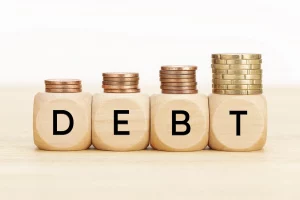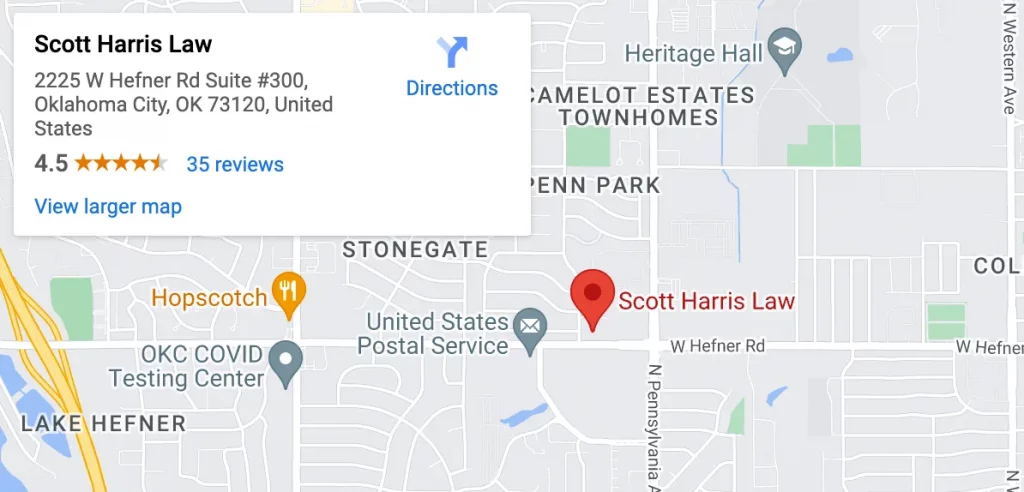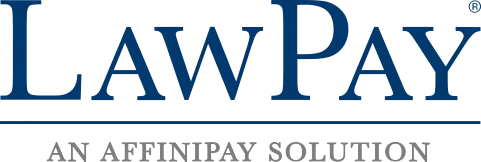Debt Consolidation Attorney in Oklahoma City, Oklahoma
For Americans in general and Oklahomans in particular, debt is becoming an increasingly big problem. When you combine it with a company that offers buy-here, pay-here auto loans and sells mechanically substandard vehicles at enormously high costs and interest rates, it is simple to understand how well-intentioned folks wind up in a downward debt spiral. It is strongly advised to speak with an Oklahoma debt consolidation attorney if any of this sounds similar.
Although there are many choices available during negotiation, you still need a skilled lawyer if you want to successfully negotiate a debt. Scott Harris, an Oklahoma Bankruptcy lawyer, is renowned for his expertise in assisting clients in settling debts through negotiation. To find out more, get in touch with our debt negotiation law office in Oklahoma to arrange a consultation about your case right now and resolve your debt issues.
Why Do I Need a Debt Consolidation Attorney in Oklahoma?
If you’re still having trouble making payments on time, you might want to speak with a reputable lawyer who can help you consolidate your debt, reduce it, or set you up with a payment schedule. The greatest approach to lowering your legal danger as well as hazards to other things like your credit score should be known by a debt consolidation attorney.
Better Solutions Compared to Other Venues
A debt consolidation lawyer may also be able to offer better solutions than a company that advertises debt reduction because, in the long run, these services frequently end up costing you more than you initially owed.
Better Chance in Debt Settlements
A debt settlement lawyer cannot guarantee that they will be able to reduce your debt. In contrast to dealing with your creditors on your own or via a debt settlement service, employing an attorney gives you a lot better chance.
If you want to start your way on fixing your debt problems the right way, start it by contacting our trusted Oklahoma Debt Consolidation Lawyer at Scott Harris Law.
What is Debt Consolidation?
With debt consolidation, you receive a single loan to pay off all of your other loans, allowing you to make monthly payments to just one creditor rather than several. The objective is to obtain a reduced interest rate, which will lower the monthly payment required.
What are the Advantages of Debt Consolidation?
 Debt consolidation proponents frequently tout this tactic as an easy method to save money and maintain your credit. Here are a few benefits of adopting debt consolidation to better manage your debt.
Debt consolidation proponents frequently tout this tactic as an easy method to save money and maintain your credit. Here are a few benefits of adopting debt consolidation to better manage your debt.
Your reputation will be protected
Debt consolidation, in contrast to bankruptcy, is not public information. Your present or potential employers can learn about bankruptcy if they search hard enough. You can access bankruptcy records at any federal bankruptcy courthouse or online through a service called PACER or Public Access to Court Electronic Records.
You continue to have access to credit
You can keep your credit cards unless such debt consolidation agreement forbids it, which could be useful in case of an emergency. If you currently owe a sizable sum of money or are behind in payment, you may no longer be allowed to use your credit cards or get authorized for further credit. (In most situations, a credit card company will revoke your card when it obtains notice of your bankruptcy.) Additionally, continuing to utilize credit cards could make debt consolidation useless.
You make your debt management simple
You no longer have to make multiple payments to various creditors at various interest rates when you consolidate your debt. Instead, you pay a single creditor with one payment.
You might receive a lower interest rate and monthly payment reduction
You can receive a lesser interest rate along with a more reasonable monthly payment if you consolidate your loans. You’ll have more money available every month to pay down your high-priority bills if you do this.
What are the Disadvantages of Debt Consolidation?
Although consolidating your debt has certain benefits, it’s not a decision to be made lightly. In the long run, consolidating your debts can result in costing you more money, and if the debt is secured, you might lose some of your property.
Your possessions can be lost
You risk losing any collateral you put up as security for a debt consolidation loan, such as your house or car if you fall behind on your payments. Additionally, the agreement may include a cross-collateralization condition if a lender grants you a debt consolidation loan. If you break the terms of the debt consolidation loan, this clause permits the lender to seize further assets it has financed.
Consider a scenario in which you obtain a car loan from a credit union and afterwards receive a debt consolidation loan from the same institution. The cross-collateralization clause allows the credit union to seize your car even if your car payments are current if you default upon that debt consolidation loan.
You may need to spend more
A debt consolidation loan may result in costing you more money, despite the fact that lower interest rates and smaller monthly payments are enticing. In exchange for lengthening the loan’s term, debt consolidation loans frequently assist you in reducing your monthly payment and interest rate (the repayment period).
You may have to pay more interest if you have debt for a longer period of time. Additionally, if you don’t have strong credit, it could be difficult to receive an unsecured debt consolidation loan with a reduced interest rate. As before, unsecured loans typically have higher interest rates than secured loans. Therefore, the resulting payment could not be sufficiently low to affect your financial situation.
Get in touch with our law firm in Oklahoma county to know more about this matter.
How Do I Consolidate My Debt?
You obtain a single loan to pay off all of your other debts in order to consolidate your debt, which allows you to make monthly payments to just one creditor rather than several. There are two types of consolidation loans: secured and unsecured.
Secured Loan
When you take out a secured loan, like a mortgage or auto loan, you give up a specific piece of property, like your house or your vehicle, as collateral to ensure that the amount will be paid back. For instance, when you obtain a mortgage loan, the security for repayment is your home. If you don’t make your mortgage payments on time, the mortgage holder may foreclose on your home to collect the debt.
Using a secured loan, you have a variety of possibilities for debt consolidation. A second mortgage, a home equity line of credit, or a refinance are all options. You can also obtain a car loan and use your vehicle as security. Or you could put other assets up as collateral for a loan. Your retirement account serves as collateral for a 401K loan. You might be able to borrow money against your life insurance policy if it has cash value. You can also get a loan backed by annuities, lottery prizes, or lawsuit claims from a number of financing companies.
Unsecured Loan
Unsecured loans are not backed by any assets that could be seized or foreclosed upon to satisfy the obligation; instead, they are relied solely on your commitment to pay. An example of an unsecured loan is a credit card. Due to the increased risk for the lender, unsecured loans typically have higher interest rates.
Unsecured personal loans are available from banks, credit unions and online lenders that you can use to pay off credit card debt and other types of debt. As an alternative for an unsecured personal loan for debt consolidation, some people also utilize a credit card with a low or free initial interest rate.
Consolidating Debt Using a Secured Loan
Debt consolidation is frequently promoted as a tactic for managing debt by its proponents. They claim it’s a simple method for saving money and preserving your credit. But there are disadvantages to this debt management strategy as well. Here are some advantages and disadvantages of using a secured loan to pay off your obligations.
Advantages of a Secured Loan for Debt Consolidation
You may save money on interest payments by combining through a secured loan because secured loans sometimes have lower interest rates than unsecured loans and credit cards. Your monthly payment will probably go down if you get a reduced interest rate, making it more manageable.
Therefore, a single payment with a lesser interest rate could significantly lessen your financial burden. Additionally, because secured loans are less risky for the lender, they are typically simpler to get than unsecured loans.
Disadvantages of Using a Secured Loan for Debt Consolidation
But there are some significant drawbacks to combining your unsecured loans into one secured loan:
- When you use assets as collateral, you endanger the property that was pledged. You risk losing your home, car, life insurance policy, retirement savings, and anything else you may have pledged as collateral for the loan if you are unable to repay it. If the loan isn’t repaid before you need the money, you can lose access to some assets, such as life insurance or retirement funds.
- A secured loan’s term, which refers to how long the lender will give you to pay back the loan, could also be longer compared to the term of the debts you combined. Therefore, although the monthly payment is lower, the total interest you pay over the course of the consolidation loan might be higher than the interest you would have paid on the individual debts.
Consolidating Debt with Unsecured Loans
Even though consolidating your debt with an unsecured loan offers some benefits, it’s not always the ideal method to handle your debt problem. Consolidating can result in costing you more money, and there may be better alternatives available to you.
Advantages of Using an Unsecured Loan for Consolidation
The fact that no property is at risk makes unsecured debt consolidation loans particularly advantageous. Additionally, even though the interest rate may be higher than that of a secured loan, it may be lower than that of the balances on your various credit card accounts or other loans, which will reduce your interest expense and payment.
Disadvantages of Using an Unsecured Loan for Consolidation
If you don’t have strong credit, an unsecured debt consolidation loan may well not lower your interest rate. In addition, unsecured loans typically have higher interest rates. Therefore, the interest rate on the loan could not be low enough to significantly alter your financial status.
The loan’s term may also be longer than the terms of the debts you merged, similar to a secured consolidation loan. As a result, although the monthly payment is lower, you can wind up paying more after all interest is taken into account.
Balance Transfer Alternatives
It might be challenging to consolidate debt using balance transfer alternatives on no-interest or low-interest credit card deals. A transfer charge is frequently required, which cancels out a portion of the savings. Furthermore, the rewards may be reduced by the card’s rules. For example, if you use your card for something else, those charges may incur interest while the no-interest balance is paid off first. Additionally, the period of no interest or low interest is typically brief. When the special offer period ends, you might have to start paying greater interest if you can’t pay off the debt during this time.
It is in your best interest to speak with an experienced Oklahoma Debt Consolidation lawyer to discover more about the alternative options available to you when consolidating your debt. Contact us right away!
What is the Impact of Debt Consolidation on My Credit?
Even though a debt consolidation loan will probably appear as a tradeline on your credit reports, if you keep up with the payments, it won’t usually have a significant impact on your credit scores, if any, according to most scoring models. However, creditors that discover a consolidation loan in your credit files may look at it poorly if you apply for credit in the future since it suggests past financial issues, particularly if the loan is from a finance firm or other comparable business.
Schedule an appointment with our trusted Oklahoma Debt Consolidation attorney to know more on how debt consolidation may affect your credit.
How Do I Know if there is a Need to Consolidate My Debt?
When determining if debt consolidation is in your best interest, take into account the following questions.
Are the Consolidation Loan Payments Affordable for You?
Even though the consolidation loan lowers your monthly payment, consolidating your debts won’t likely improve your financial situation if you don’t have a reliable source of income or if you can’t afford the increased payment.
Does a Consolidation Loan Lower Your Interest?
It definitely isn’t worth the added expense and costs to consolidate if you can’t acquire a lower interest rate with a consolidation loan.
When will the consolidation loan be paid off?
You’ll probably pay extra interest throughout the course of the loan if you expand the repayment term while consolidating your debt.
What are Alternative Ways for Debt Relief?
You likely have additional possibilities for breaking out of financial difficulties as long as you possess income that isn’t going toward your essential monthly obligations, such as
- Creating a budget that enables you to meet your debt commitments on time
- Approaching your creditors to work out a solution, such as a lower minimum payment, a lower interest rate, or the elimination of late fees or other charges
- Negotiating a lower settlement for your debts by yourself or using the assistance of a reputable credit counseling organization or attorney (but avoid debt settlement businesses), or
- Establishing a proper debt management strategy, or
- Filing bankruptcy
Every individual with concerns related to their debts has their own unique situations. In order to learn what alternative is suitable for you, get in touch with Scott Harris Law.
Call our Debt Consolidation Lawyer Now!
It’s time to get in touch with our experienced attorney at Scott Harris Law if you require assistance with financial problems. We will meet with you to go over your issue and any potential choices. We can advise you on the appropriate course of action to take in order to start defending your rights.
If you have any extra worries other than Debt Negotiation, such as the Bankruptcy case (Chapter 7 Bankruptcy and Chapter 13 Bankruptcy), Student Loans Debt, or Foreclosure Defense, you could also consider speaking with our knowledgeable attorney.




